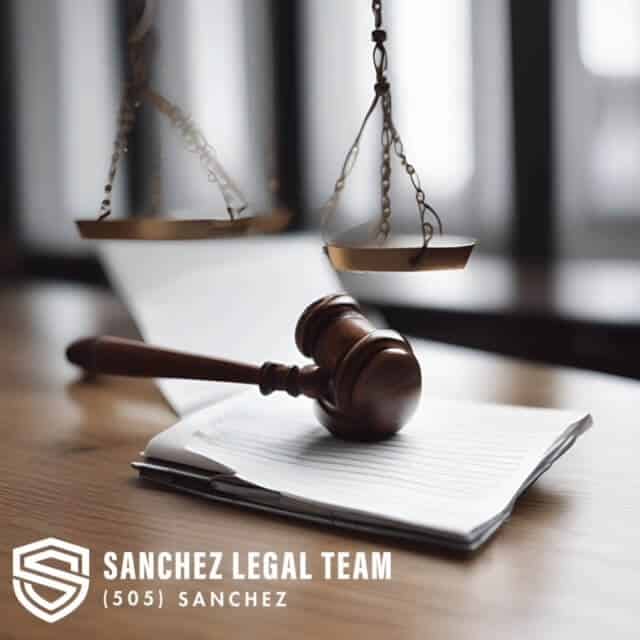Going through a divorce can be an emotional rollercoaster and understanding the timeline of the process is essential for those seeking a breakup in New Mexico. From the initial filing to the final decree, it’s crucial to navigate the legal system correctly to ensure a smooth transition.
Starting with the filing, New Mexico requires one party to file a Petition for Dissolution of Marriage to initiate the process. Once filed, there are several steps that usually take place before the assigned judge can grant the divorce.
While the divorce is pending, various legal procedures and negotiations take place. These include the discovery process, division of community property, child custody/visitation issues, and spousal support.
Understanding the timeline and legal requirements can alleviate stress and uncertainty during the divorce process in New Mexico.
UNDERSTANDING THE TIMELINE OF A DIVORCE IN NEW MEXICO
Navigating the timeline of a divorce in New Mexico involves several stages. The process typically begins with one party filing a Petition for Dissolution of Marriage with the court, initiating the legal proceedings.
Once filed, the case sits dormant until either side files the appropriate motion. In other words, divorce cases are not self-propelling and either side must move the case forward by filing the proper motion.
With the typical divorce, several key processes take place after the case is opened. These processes include the mandatory exchange of financial information under Rule 1-123. This mandatory information includes proof of income, expenses, and necessary asset and debt information.
On the light end, both sides can exchange the information informally through email. On the more complex end, both sides can potentially exchange formal discovery (interrogatories & request for production of documents). Formal discovery often requires the other side to provide detailed statements and financial documents.
After financial information has been exchanged, both sides can begin negotiations on the necessary issues to complete the divorce. These issues include financial aspects such as division of community assets, debts, and spousal support.
Are children involved with the divorce? If so, both sides must reach an agreement on key issues such as child custody, visitation, and child support.
Understanding the timeline helps individuals anticipate the stages of the divorce process and prepare accordingly.
By familiarizing oneself with the timeline of a divorce in New Mexico, individuals can approach the process with a clearer understanding of what to expect at each stage. This knowledge can help alleviate anxiety and uncertainty, enabling a more informed and strategic approach to navigating the legal proceedings.
Check out this video to better understand the family court process in New Mexico.
PREPARING FOR THE DIVORCE PROCESS IN NEW MEXICO
Preparing for a divorce in New Mexico involves several key steps to ensure a smoother transition through the legal proceedings. One essential aspect of preparation is gathering all necessary documentation, including financial records, taxes, bank statements, and any relevant communication or evidence that may support your case.
During this process, it is imperative to speak with an experienced Albuquerque divorce attorney. A qualified New Mexico divorce attorney can help you understand NM divorce laws. Moreover, a trusted and tested Albuquerque divorce attorney can guide you through the process and provide valuable legal advice.
An Albuquerque divorce attorney can help you understand your rights, obligations, and options during the divorce proceedings, ensuring that your interests are protected.
Additionally, taking care of your emotional well-being is crucial during this challenging time. So, consider seeking support from friends, family, or a therapist.
This emotional support can help you cope with the emotional toll of divorce and maintain a positive outlook as you navigate the process.
THE INITIAL FILING AND SERVING OF DIVORCE PAPERS
The divorce process in New Mexico begins with the filing of a Petition for Dissolution of Marriage with the appropriate court. Moreover, one spouse must live in New Mexico for six consecutive months before filing in one’s county.
For instance, Albuquerque residents file in Bernalillo County, Second Judicial District Court. On the other hand, Los Lunas/Belen residents file with Valencia County District Court. Finally, Rio Rancho residents file for divorce in Sandoval County.
Once the petition is filed, the other party must be served with the divorce papers to notify them of the legal proceedings.
Serving divorce papers involves delivering the documents in person or through a designated third party, such as a process server. Proper service ensures that the other party is aware of the divorce proceedings and has an opportunity to respond within the specified timeframe.
Best practice is to physically serve the other side with the divorce papers and then file a Return of Service demonstrating the date of personal service. Also, the person serving the divorce papers cannot be a party to the case (i.e. spouse or attorney).
After the initial filing and service of divorce papers, the legal process begins to unfold. This process sets the stage for negotiations, discovery, and completing the mandator divorce settlement facilitation.
Most cases can and should be resolved through settlement facilitation/mediation. However, when the issues cannot be resolved through settlement facilitation, the court must hear and decide the issues through an evidentiary hearing (trial on the merits).
THE DISCOVERY PHASE AND GATHERING EVIDENCE
During the discovery phase of a divorce in New Mexico, both parties are required to exchange relevant information and documentation regarding their finances, assets, debts, and other pertinent matters. This process allows each party to gain a comprehensive understanding of the marital estate and make informed decisions during negotiations.
Gathering evidence to support your case is crucial during the discovery phase. This may include financial records, property deeds, bank statements, tax returns, and any other documentation that supports your claims regarding asset/debt division, child custody, or spousal support.
Working closely with your attorney during the discovery phase can help ensure that all necessary information is collected and presented effectively to support your interests and position in the divorce proceedings.
Proper preparation during this phase can strengthen your case and improve the likelihood of achieving a favorable outcome. In other words, uncovering all the necessary financial information is crucial to ensure that all financial issues are resolved correctly.
Trying to resolve your divorce without all the essential financial information is like trying to solve a puzzle without all the pieces.
NEGOTIATING A SETTLEMENT OR GOING TO TRIAL
After the discovery phase, both sides are required to complete settlement facilitation/mediation before the court will grant a trial. Settlement facilitation is a process where a trained and highly experienced mediator attempts to guide both sides towards a resolution on all issues.
These issues include division of community assets/debts, child custody, visitation rights, and spousal support. As mentioned, the court will not set a trial until both sides participate in settlement facilitation.
If both sides are unable to reach a complete agreement through negotiations and/or settlement facilitation, the case may proceed to trial. Most judges will openly warn spouses that they are better off resolving their divorce issues through mediation rather than trial.
You see, mediation enables both sides to take control and decide the terms of their divorce. A trial, on the other hand, gives the judge complete power to decide issues.
Going to trial can be a more time-consuming, uncertain, stressful, and costly process. Nevertheless, a divorce trial is necessary in cases where both sides cannot agree on key issues. This disagreement may be based on one or both sides having unrealistic expectations. It can also be caused by unreasonable demands, or a desire to stretch out the matter.
From beginning to end, it is essential to have a tested and trusted Albuquerque divorce attorney advocate for your rights and interests throughout the process. An experienced Albuquerque family law attorney can provide valuable guidance and representation to help you achieve a fair and equitable resolution to your divorce.
Are you looking for a reliable and seasoned New Mexico divorce lawyer? Look no further. Sanchez Legal Team has one of Albuquerque’s best divorce lawyers for your case. Call (505) SANCHEZ and talk with a top-rated NM divorce attorney.
DIVISION OF COMMUNITY ASSETS AND DEBTS IN A DIVORCE
One of the most critical aspects of a divorce in New Mexico is the division of assets and debts acquired during the marriage. New Mexico is a community property state. This means that most property and debt accumulated during the marriage is evenly split upon divorce.
Community assets may include real estate, vehicles, financial accounts, retirement savings, investments, and personal belongings acquired during the marriage. Conversely, community debts include credit card balances, medical debt, student loan debt, or other debts built during the marriage.
It is essential to identify and value all community assets and debts accurately to ensure a fair distribution during the divorce process. As such, it is critical to uncover all the necessary information through the discovery process outlined above.
Factors such as the duration of the marriage, each party’s financial contributions, earning capacity, and future needs may influence whether spousal support is awarded. In turn, these aspects can determine how community assets and debts are divided.
Working with a knowledgeable New Mexico divorce lawyer can help you navigate the complexities of asset and debt division. In doing so, an affordable and reliable Albuquerque divorce attorney can ensure that your rights are protected throughout the process.
Check out this video to better understand how community assets/debts are divided during a New Mexico divorce.
CHILD CUSTODY AND SUPPORT CONSIDERATIONS IN NEW MEXICO
Child custody and support are key issues in divorce cases involving minor children in New Mexico. When determining child custody arrangements, the court prioritizes the best interests of the child. In doing so, the court considers factors such as the child’s age, relationship with each parent, and the ability of each parent to provide a stable and nurturing environment.
First, parents must decide on child custody. New Mexico presumes that children are best served by joint legal custody. Joint legal custody means that both parents share decision-making responsibilities.
Conversely, sole legal custody means that one parent can exclusively make decisions that impact the child. These decisions include medical, religion, education, and extra-curricular decisions. At times, the court can grant one parent sole legal custody.
Finally, both sides must agree on child support. Here, child support obligations are determined based on the New Mexico Child Support Guidelines. The NM Guidelines consider factors such as each parent’s income, the number of children, time-sharing, and additional expenses related to childcare and healthcare.
Ensuring that child custody and support arrangements are fair and in the best interests of the child is essential for a successful divorce resolution.
FINALIZING THE DIVORCE AND POST-DIVORCE MATTERS
Once all issues have been resolved, either through settlement negotiations or a trial, the divorce can be finalized through a court order known as the Final Decree of Dissolution of Marriage. This decree officially terminates the marriage and incorporates the Marital Settlement Agreement and Parenting Plan.
Following the finalization of the divorce, parties must follow the divorce terms and fulfill their respective obligations. These obligations can include transferring assets, making support payments, and complying with custody arrangements.
It is essential to maintain open communication and cooperation to ensure a smooth transition for all parties involved. Failing to do so could lead to a motion to enforce being filed. In turn, this motion could include an increase in the overall time and expense of the divorce matter.
Post-divorce matters may include modifications to child custody, visitation, or child support. Also, post-divorce matters may involve a motion to enforce that addresses one side’s failure to follow the divorce’s terms and requirements.
Having a clear understanding of post-divorce rights and responsibilities can help parties navigate potential challenges and seek legal remedies if needed.
While divorce can be challenging, it also presents an opportunity for a fresh start and a new chapter in life.
Are you looking to end your marriage and start a new and better chapter in your life? If so, Sanchez Legal Team’s top Albuquerque divorce attorneys are here to help.
Call (505) SANCHEZ and speak with one of Albuquerque’s best uncontested divorce lawyers. Our team of legal professionals excel at divorces involving restraining orders, domestic violence, and child custody issues.
Your family deserves the best. Don’t trust a fly-by-night attorney to protect your family. The Sanchez family has lived in New Mexico for five strong generations.
Call (505) SANCHEZ today.










